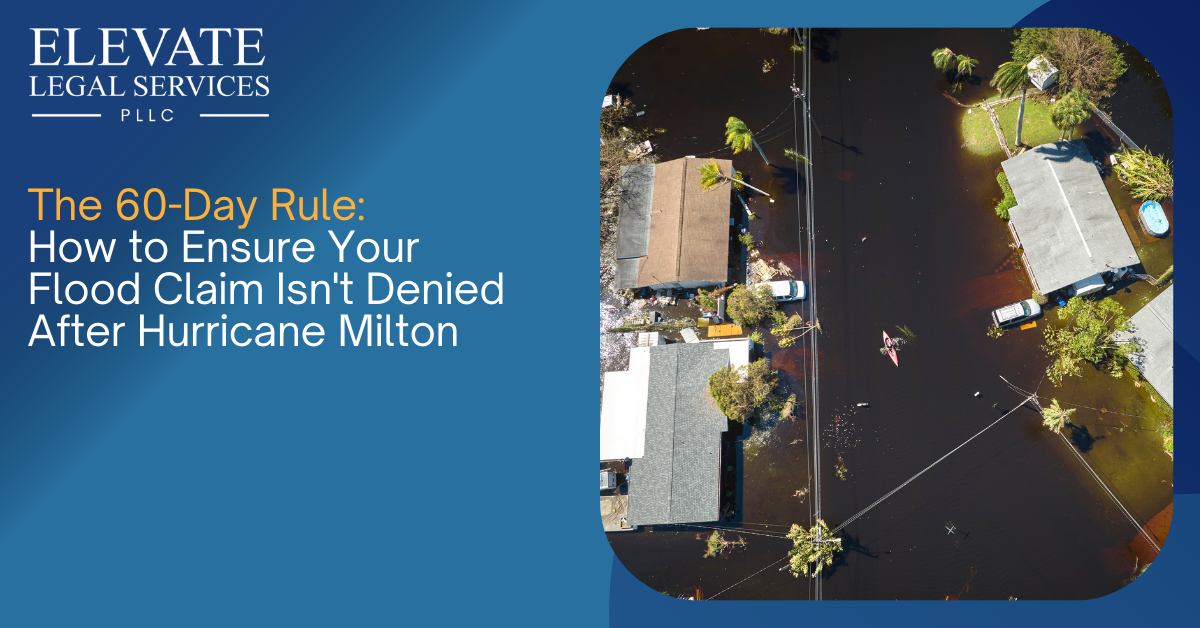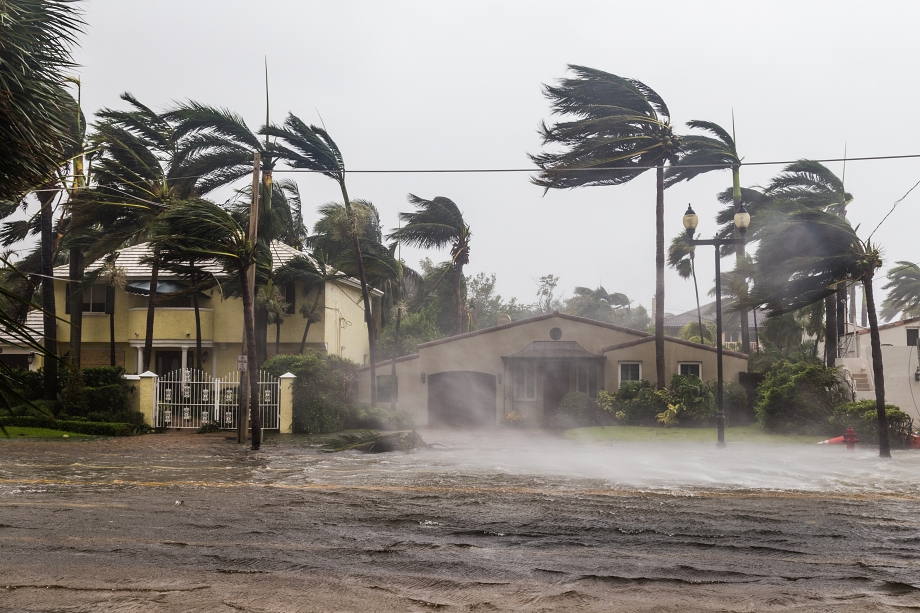
As Hurricane Milton sweeps through, many homeowners and businesses will face the daunting task of dealing with flood damage. The process of filing a flood insurance claim can be overwhelming, especially when time is of the essence. Under the National Flood Insurance Program (NFIP), there is a critical deadline: The 60-day rule: how to ensure your flood claim isn’t denied and all policyholders need to be awarded. Missing this deadline can result in your flood damage claim being denied with no chance for appeal. Let’s break down what this rule means, why it’s so important, and how you can ensure your claim is properly filed and supported.
At Elevate Legal Services, PLLC, we are recognized nationwide for our expertise in federal flood insurance claims. Unlike state-regulated insurance, flood coverage is governed by complex federal laws that require strict compliance. Failing to meet these specific requirements can jeopardize your ability to recover compensation for flood damage. To ensure you secure the compensation you’re entitled to, our team at Elevate Legal Services, PLLC, will guide you through the entire claims process. Contact us today at 561-770-3335 or email [email protected] for expert assistance with your flood insurance claim.
What Is the 60-Day Rule?
 The 60-day rule is a requirement under the NFIP that mandates policyholders to submit a sworn Proof of Loss statementwithin 60 days of the date of the flood damage. The Proof of Loss is a document that provides a detailed account of the damage and losses you have sustained, along with the estimated cost of repairs or replacement.
The 60-day rule is a requirement under the NFIP that mandates policyholders to submit a sworn Proof of Loss statementwithin 60 days of the date of the flood damage. The Proof of Loss is a document that provides a detailed account of the damage and losses you have sustained, along with the estimated cost of repairs or replacement.
This rule is strictly enforced. Missing the 60-day window means that your claim could be automatically denied, even if you have extensive damage and ample evidence of your losses. The NFIP’s strict guidelines leave very little room for extensions or corrections once the deadline has passed, making it absolutely crucial to adhere to this timeframe.
Why Is the 60-Day Rule So Important?
The aftermath of a hurricane like Hurricane Milton is chaotic and stressful, with many homeowners focused on cleanup, temporary housing, and protecting their families. Amidst this upheaval, understanding and meeting the 60-day requirement might seem like a daunting task, but failing to do so can have serious financial consequences. Here’s why this deadline is so important:
- Prevents Automatic Claim Denials: If the sworn Proof of Loss form is not submitted within the 60-day period, your flood insurance claim can be denied outright, leaving you with no recourse for reimbursement.
- Establishes the Basis for Your Claim: The Proof of Loss statement is the foundation of your claim. It serves as the official record of the extent of your flood damage and sets the stage for negotiations with your insurer.
- Avoids Delays in Receiving Payment: Meeting the 60-day deadline helps to expedite the claims process, ensuring that you receive payment faster to cover repairs and replacements. This can be vital for homeowners looking to get back on their feet after Hurricane Milton.
How to Ensure Your Flood Claim Isn’t Denied
With the strict 60-day rule in mind, here are the essential steps you should take to ensure your flood claim is properly submitted and supported:
1. Contact Your Insurance Agent Immediately
As soon as it is safe to return to your property after Hurricane Milton, contact your insurance agent or the company that has issued your flood insurance policy. This initial contact is important for starting the claims process. Make sure to get the following information:
- Your policy number
- Specific instructions on how to complete the Proof of Loss form
- Any forms or documentation requirements needed for filing
If you’re unsure who your flood insurance carrier is, you can call FEMA’s helpline at800-745-0243, or you can contact our team at Elevate Legal Services, PLLC for assistance.
2. Document the Damage Thoroughly
Proper documentation is critical for a successful flood claim. Use these tips to capture the full extent of the damage caused by Hurricane Milton:
- Photograph Every Room: Take multiple photos and videos of each room, showing water levels, damaged walls, floors, furniture, and appliances. Make sure to capture close-up shots of specific damage and wide shots to provide context.
- Record Details of Personal Property: For each damaged item, note its make, model, serial number, and approximate value. This information should be included in your Proof of Loss statement.
- Keep All Receipts and Estimates: Save receipts for any emergency repairs or temporary living expenses. These expenses may be reimbursable under your policy.
3. Work with a Professional Adjuster or Attorney
Dealing with flood damage claims is complex, especially when dealing with the NFIP’s strict rules. Consider hiring a professional adjuster or working with an attorney who specializes in flood damage claims to ensure that your Proof of Loss is accurately completed and properly submitted. At Elevate Legal Services, PLLC, our team has extensive experience handling NFIP claims and can help ensure you meet all deadlines and requirements.
4. Submit the Proof of Loss Form on Time
 Once you have gathered all the necessary information and documentation, submit your Proof of Loss formwithin the 60-day window. Double-check that your form includes:
Once you have gathered all the necessary information and documentation, submit your Proof of Loss formwithin the 60-day window. Double-check that your form includes:
- A detailed inventory of damaged property
- Estimates for repairs or replacements
- Photographs and other supporting documents
Make sure to keep a copy of the completed Proof of Loss form and all accompanying documents for your records. You should also confirm with your insurance company that they have received your submission.
5. File for FEMA Assistance if Applicable
If Hurricane Milton results in a Presidential Disaster Declaration, you may be eligible for additional assistance through FEMA. This is separate from your flood insurance claim and can provide immediate relief for temporary housing and emergency expenses. It’s a good idea to apply for FEMA assistance while waiting for your flood insurance claim to be processed, especially if you need immediate financial support.
How Elevate Legal Services Can Help
Even with thorough documentation and a timely submission, disputes can arise during the flood claims process. If your claim is denied or underpaid, Elevate Legal Services, PLLC, is here to help. Our team can:
- Review Your Claim: We analyze the reasons behind any claim denial or underpayment and look for ways to strengthen your case.
- Negotiate with Insurers: We handle communication and negotiations with insurance companies, ensuring that your claim is handled fairly.
- Represent You in Court: If necessary, we can represent you in court to pursue the compensation you deserve for your flood damage claim.
Don’t Wait—Act Now
Hurricane Milton has already caused significant damage, and time is running out to file your flood damage claim. The 60-day rule can be a challenge, but with the right preparation and support, you can avoid common pitfalls and ensure your claim is processed smoothly.
If you need assistance with your flood damage claim, contact Elevate Legal Services, PLLC today at 561-770-3335 or email us at [email protected] for a free case evaluation. Our experienced attorneys will help you navigate the complexities of the NFIP and make sure you receive the compensation you’re entitled to. Don’t let the flood damage from Hurricane Milton become a financial burden—let us help you recover and rebuild.





